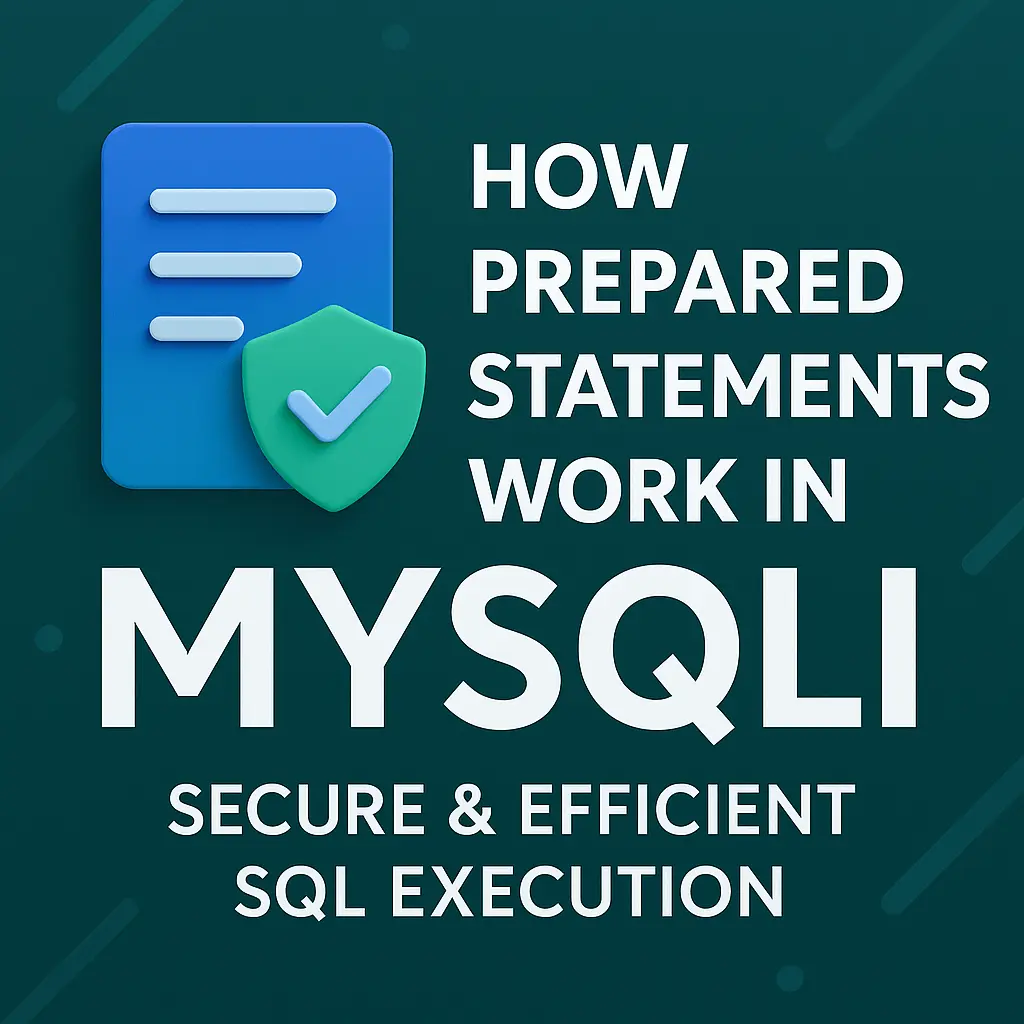What Are Prepared Statements?
Prepared statements are SQL queries that are precompiled and stored in the database server. They allow the separation of query logic from data, which enhances security and efficiency. A prepared statement involves two main steps:- Preparation: The SQL statement template is sent to the database server, where it is parsed, compiled, and optimized. This step happens only once.
- Execution: The prepared statement is executed with different parameters. This step can be repeated multiple times with different values.
Basic Example
Consider the following SQL query for inserting data into a users table:
INSERT INTO users (username, email) VALUES (?, ?);
How Prepared Statements Work
Step-by-Step Process
1. Preparation Phase
In the preparation phase, the SQL statement is sent to the database server where it is parsed and compiled. This involves checking the syntax, generating an execution plan, and reserving resources for executing the statement.Example in PHP
<?php
$servername = "localhost";
$username = "username";
$password = "password";
$dbname = "database";
// Create connection
$conn = new mysqli($servername, $username, $password, $dbname);
// Check connection
if ($conn->connect_error) {
die("Connection failed: " . $conn->connect_error);
}
// Prepare the statement
$stmt = $conn->prepare("INSERT INTO users (username, email) VALUES (?, ?)");
?>
2. Parameter Binding
Once the statement is prepared, parameters are bound to the placeholders. Binding parameters is a crucial step that ensures the data provided is treated as values and not as part of the SQL query, thus preventing SQL injection.Example in PHP
<?php
// Bind parameters
$stmt->bind_param("ss", $username, $email);
// Set values and execute
$username = "johndoe";
$email = "johndoe@example.com";
$stmt->execute();
?>
3. Execution Phase
During the execution phase, the database server executes the precompiled SQL statement with the bound parameters. This can be done multiple times with different values.Example in PHP
<?php
// Execute the prepared statement multiple times
$usernames = ["johndoe", "janedoe"];
$emails = ["johndoe@example.com", "janedoe@example.com"];
foreach ($usernames as $index => $username) {
$email = $emails[$index];
$stmt->execute();
}
?>
Internal Mechanisms
Parsing and Compilation
During the preparation phase, the SQL statement is parsed and compiled by the database server. This process involves:- Syntax Check: Ensuring the SQL syntax is correct.
- Execution Plan Generation: Creating an efficient execution plan for retrieving or modifying data.
- Resource Allocation: Reserving resources needed for executing the statement.
Caching and Reuse
Once prepared, the statement is cached by the server. Subsequent executions reuse the cached statement, avoiding the overhead of parsing and compiling the SQL each time. This reuse leads to performance improvements, especially for repeated queries.Security Mechanisms
Prepared statements enhance security by ensuring that data values are treated strictly as data. The placeholders (?) in the SQL template are replaced with actual data values during execution, preventing any possibility of SQL injection.Advantages of Using Prepared Statements
Security Benefits
Prevention of SQL Injection
SQL injection is a critical vulnerability that occurs when user input is incorrectly handled, allowing attackers to manipulate SQL queries. Prepared statements mitigate this risk by separating the SQL code from data values.Vulnerable Example
<?php
$username = $_POST['username'];
$password = $_POST['password'];
$query = "SELECT * FROM users WHERE username = '$username' AND password = '$password'";
$result = mysqli_query($conn, $query);
?>
In this example, an attacker could manipulate the input to gain unauthorized access.
Secure Example with Prepared Statements
<?php
$stmt = $conn->prepare("SELECT * FROM users WHERE username = ? AND password = ?");
$stmt->bind_param("ss", $username, $password);
$username = $_POST['username'];
$password = $_POST['password'];
$stmt->execute();
$result = $stmt->get_result();
?>
By using prepared statements, user inputs are safely bound to the query, preventing SQL injection.
Performance Benefits
Reduced Parsing and Compilation Overhead
Prepared statements reduce the overhead of parsing and compiling SQL queries. Once a statement is prepared, it can be executed multiple times without re-parsing and recompiling, leading to significant performance gains.
Performance Comparison Example
<?php
// Without prepared statements
for ($i = 0; $i < 1000; $i++) {
$username = "user" . $i;
$email = "user" . $i . "@example.com";
$query = "INSERT INTO users (username, email) VALUES ('$username', '$email')";
mysqli_query($conn, $query);
}
// With prepared statements
$stmt = $conn->prepare("INSERT INTO users (username, email) VALUES (?, ?)");
for ($i = 0; $i < 1000; $i++) {
$username = "user" . $i;
$email = "user" . $i . "@example.com";
$stmt->bind_param("ss", $username, $email);
$stmt->execute();
}
?>
In this example, the prepared statement version avoids the repeated parsing and compilation, making it more efficient.
Network Traffic Reduction
Prepared statements can reduce network traffic by sending the SQL template once and only the parameter values on subsequent executions.
Example
<?php
$stmt = $conn->prepare("INSERT INTO users (username, email) VALUES (?, ?)");
for ($i = 0; $i < 1000; $i++) {
$username = "user" . $i;
$email = "user" . $i . "@example.com";
$stmt->bind_param("ss", $username, $email);
$stmt->execute();
}
?>
This example demonstrates how the SQL template is sent once, and only the parameter values are sent multiple times, reducing network load.
Ease of Use and Maintenance
Cleaner Code
Prepared statements separate SQL logic from data values, making the code cleaner and easier to maintain.
Example
<?php
$stmt = $conn->prepare("INSERT INTO users (username, email) VALUES (?, ?)");
$stmt->bind_param("ss", $username, $email);
$usernames = ["johndoe", "janedoe"];
$emails = ["johndoe@example.com", "janedoe@example.com"];
foreach ($usernames as $index => $username) {
$email = $emails[$index];
$stmt->execute();
}
?>
This example highlights the clean separation of SQL logic and data.
Conclusion
Prepared statements in MySQLi offer a robust solution for enhancing security, improving performance, and maintaining cleaner code. By separating SQL query logic from data, they prevent SQL injection attacks and reduce the overhead associated with parsing and compiling SQL statements multiple times. Additionally, they help in managing network traffic efficiently and make the codebase easier to read and maintain.
Summary of Key Points
- Security: Prepared statements prevent SQL injection by treating user inputs as data values, not executable SQL code.
- Performance: They reduce parsing and compilation overhead and optimize network traffic, leading to faster query execution.
- Maintainability: Prepared statements lead to cleaner and more maintainable code by separating SQL logic from data values.
By understanding the internal workings of prepared statements and leveraging their benefits, developers can build more secure, efficient, and maintainable database-driven applications. Start integrating prepared statements into your MySQLi interactions today to take advantage of these powerful features.






